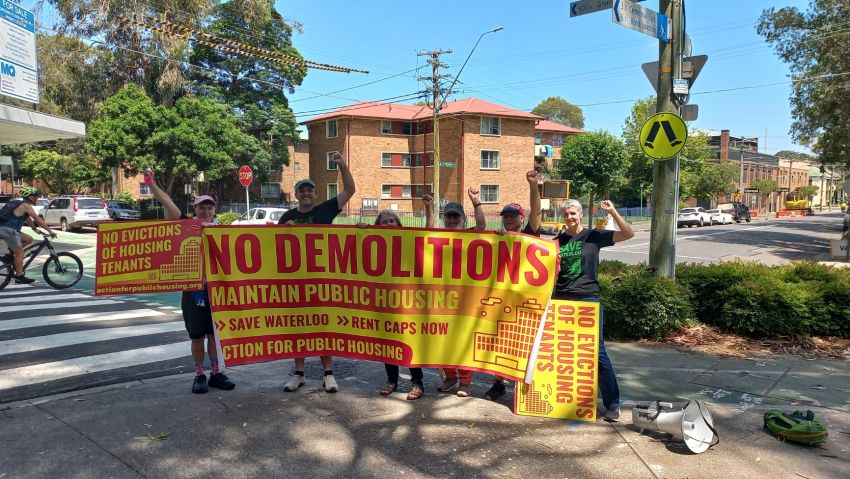
When NSW Labor won the election in 2023, there was hope that the housing affordability crisis might ease. Two years on, those hopes have been dashed.
Housing minister Rose Jackson has continued the neoliberal policies of the previous Coalition government and the cost of housing has continued to dramatically rise.
In the leadup to the last election, the Coalition's disastrous record on public housing was hard to miss.
Premiers Barry O’Farrell, Mike Baird, Gladys Berejiklian and Dominic Perrottet had sold off $3 billion worth of public housing, including the iconic Sirius building in The Rocks and all of it in Millers Point. They also privatised about a third of all public housing under the Social Housing Management Transfer Program.
Labor in opposition, wanted to distance itself from that, and made a number of pre-election promises including to stop the sale of public housing and privatisation.
“We are immediately freezing the sale of all public and social housing”, then opposition leader Chris Minns said. He sent SMS messages to Waterloo residents that read: “ONLY LABOR WILL STOP THE SELL-OFF & PRIVATISATION OF PUBLIC HOUSING IN NSW!”. Jackson, then the shadow housing minister, and several Labor councillors sent similar messages.
Labor started breaking its promises soon after it was elected.
The biggest demolition and privatisation plan, on the books from the Coalition, was at Waterloo. At a housing forum in June 2023, Jackson claimed that the plans could not be stopped. Since then, the revised plans have about 70% of the renewal area marked as private housing, or privately owned, and managed “affordable” housing.
Since then, very similar public housing privatisation plans have continued in Redfern, Glebe, South Eveleigh, Telopea, Mascot, Maroubra and Kingsford, despite vocal community campaigns to stop them.
The number of households on the NSW public and community housing waiting list since mid-2023 has grown from about 56,000 to 66,000.
Action for Public Housing wrote to Jackson in February asking if there was any target to reduce the length of the waitlist. Homes NSW’s response was effectively “No”. It said “the size of the waitlist may not be the best measure of how effectively the NSW Government is addressing demand for social housing”.
Its response made no reference to any other existing target, merely mentioning it was “giving careful consideration to setting targets”.
If Labor was not going to keep its promises, or set meaningful targets, one could at least hope for an admission of truth about the matter.
A strong pro-public housing resolution put to the NSW Labor conference was passed in 2022. Moved by Zac Gillies-Palmer and seconded by Rita Mallia, then president of the Construction, Forestry and Maritime Employees Union NSW branch, the motion bound a future Labor government to “implement legislation which places a moratorium on the privatisation of public housing including the sale, outsourcing, or leasing of any public housing assets or services”.
Asked about the motion at the June 2023 housing forum, the new housing minister affirmed it was government policy. Federal Labor MP Tanya Plibersek was present at the forum.
Action for Public Housing again asked Jackson in April about the privatisation and outsourcing of public housing and whether NSW Labor would enact the motion with a new law. Despite repeated requests, she has not replied.
Gillies-Palmer told Green Left that “the actions of the NSW Labor government betray the binding motion delegates passed unanimously in 2022. If Rose Jackson won’t admit that she’s torn up Labor’s promise, or reply to questions about it, I think that’s cowardly.”
Jackson and the Minns government refuse to admit that the “redevelopment” of public housing are really privatisations, even though the proportion of private homes is usually more than 50%, with the rest in some combination of private management or ownership.
In a letter sent to the hundreds of objectors to the redevelopment plans of the once 100% public housing site at 600 Elizabeth Street, Redfern, Jackson wrote: “I agree privatisation of this project would not be in the public interest, which is why Homes NSW is partnering with Bridge Housing, a not-for-profit community housing provider.”
This is Orwellian doublespeak. Community Housing Providers (CHP) are still private; CHPs typically pay their chief executives more than $300,000 a year. Transfers of public housing to CHPs threaten public sector jobs and have led to public housing offices being closed. The greater use of the umbrella term “social housing” is used to erode the important distinction between public and private housing.
Labor’s dishonesty and lack of will to do anything useful to fix the housing crisis mean that 35,000 people are homeless every night and 1.6 million are in housing stress, in NSW. There are 3 million people at risk of homelessness across the country.
[Andrew Chuter is a member of Action for Public Housing.]